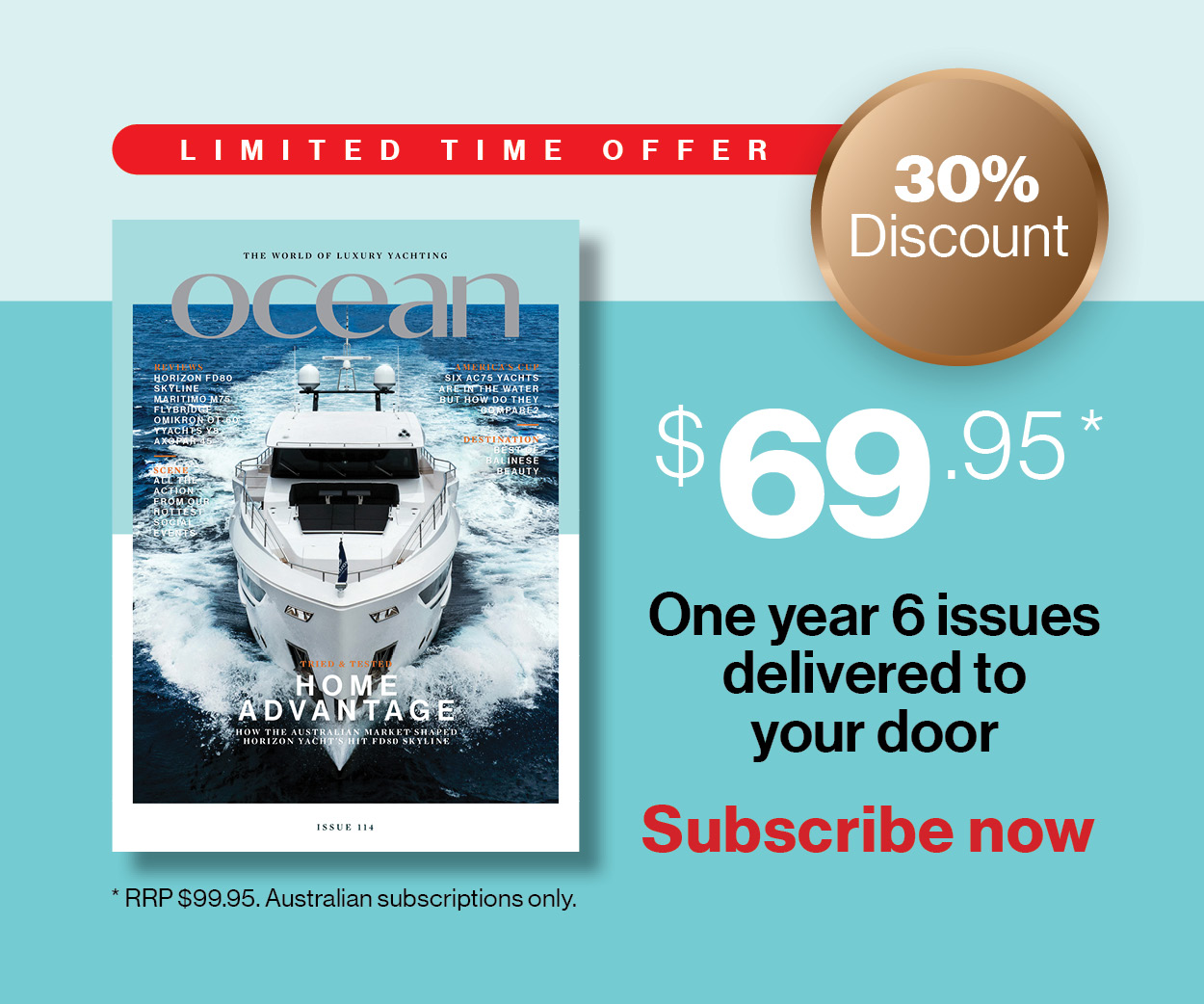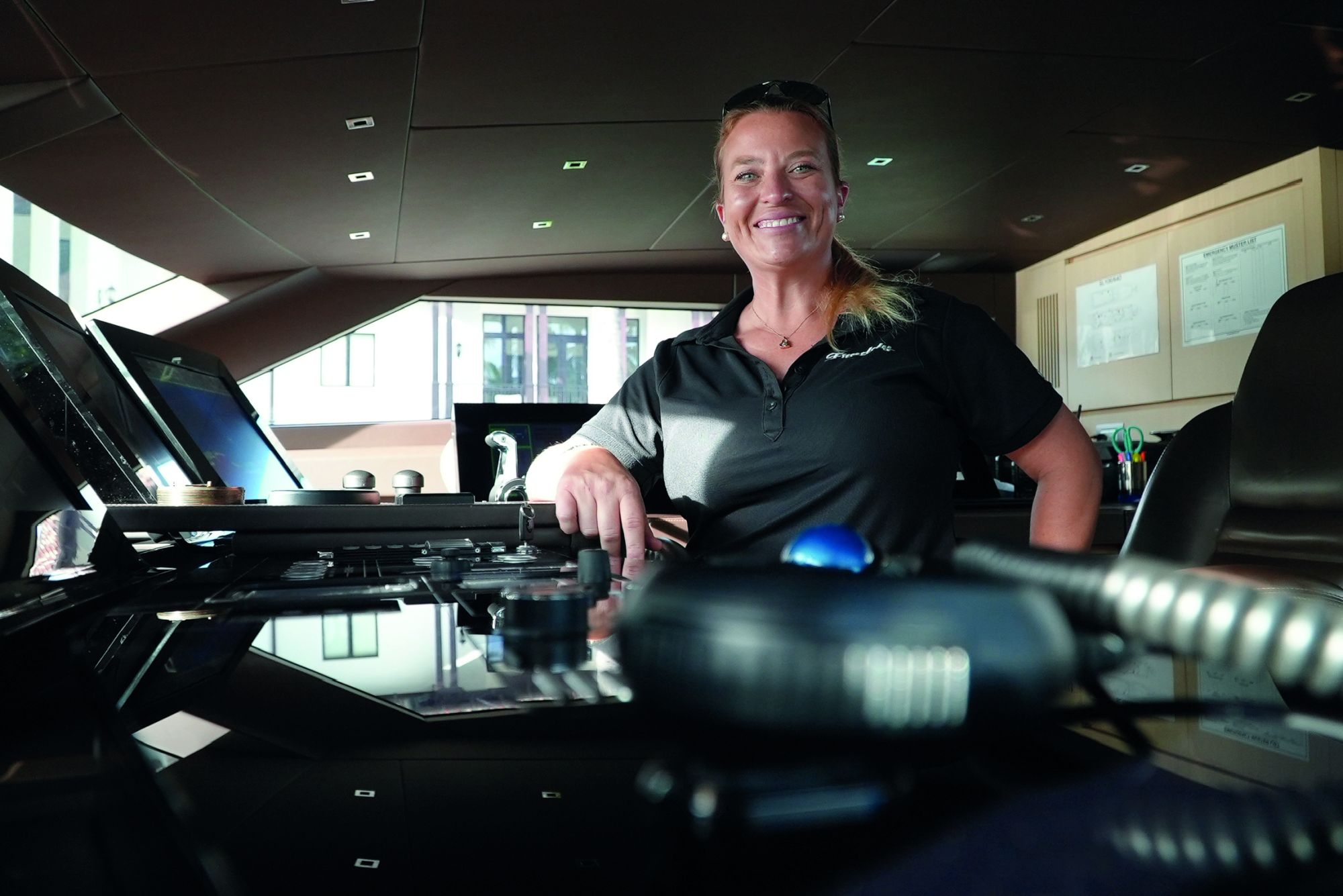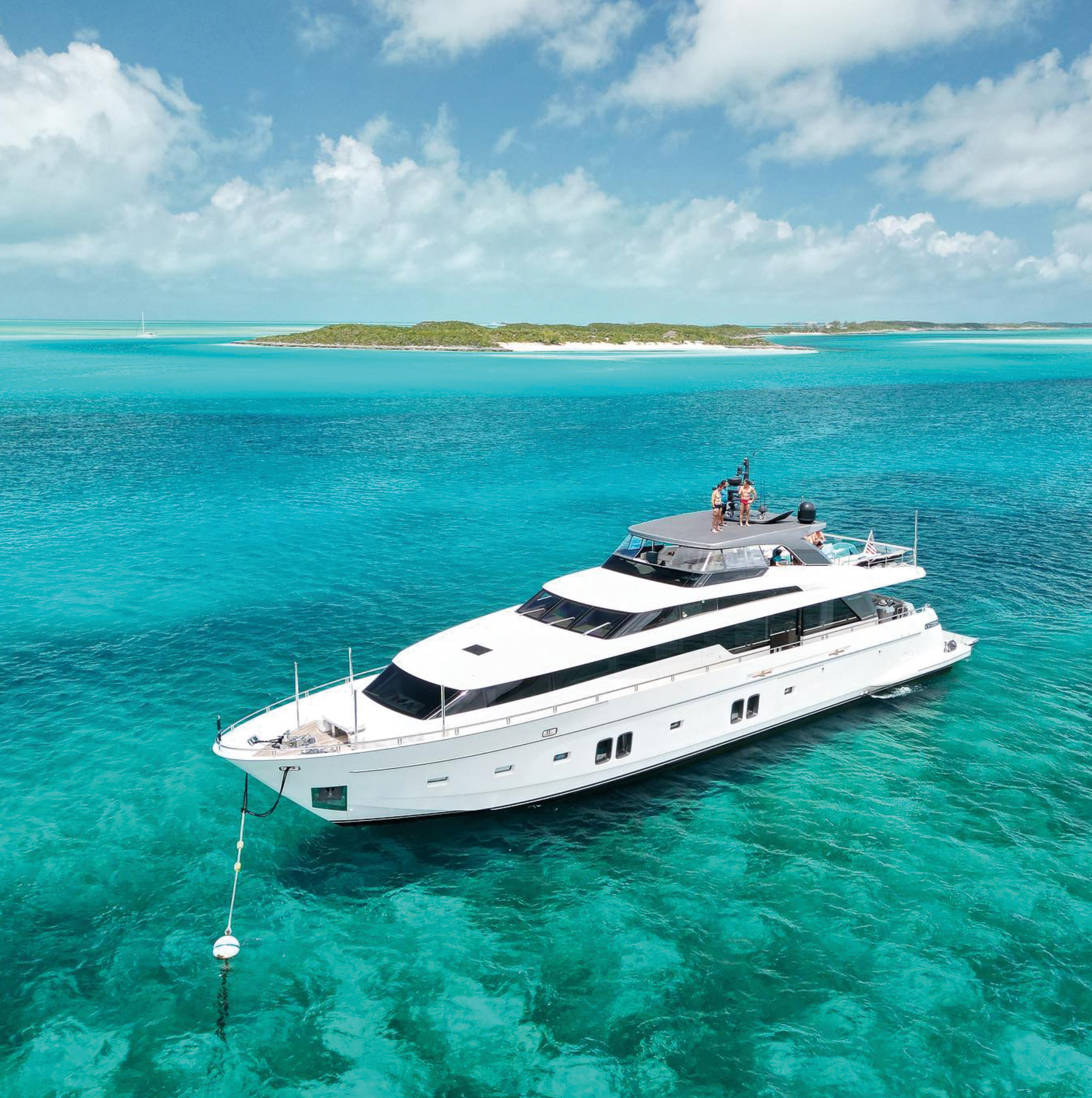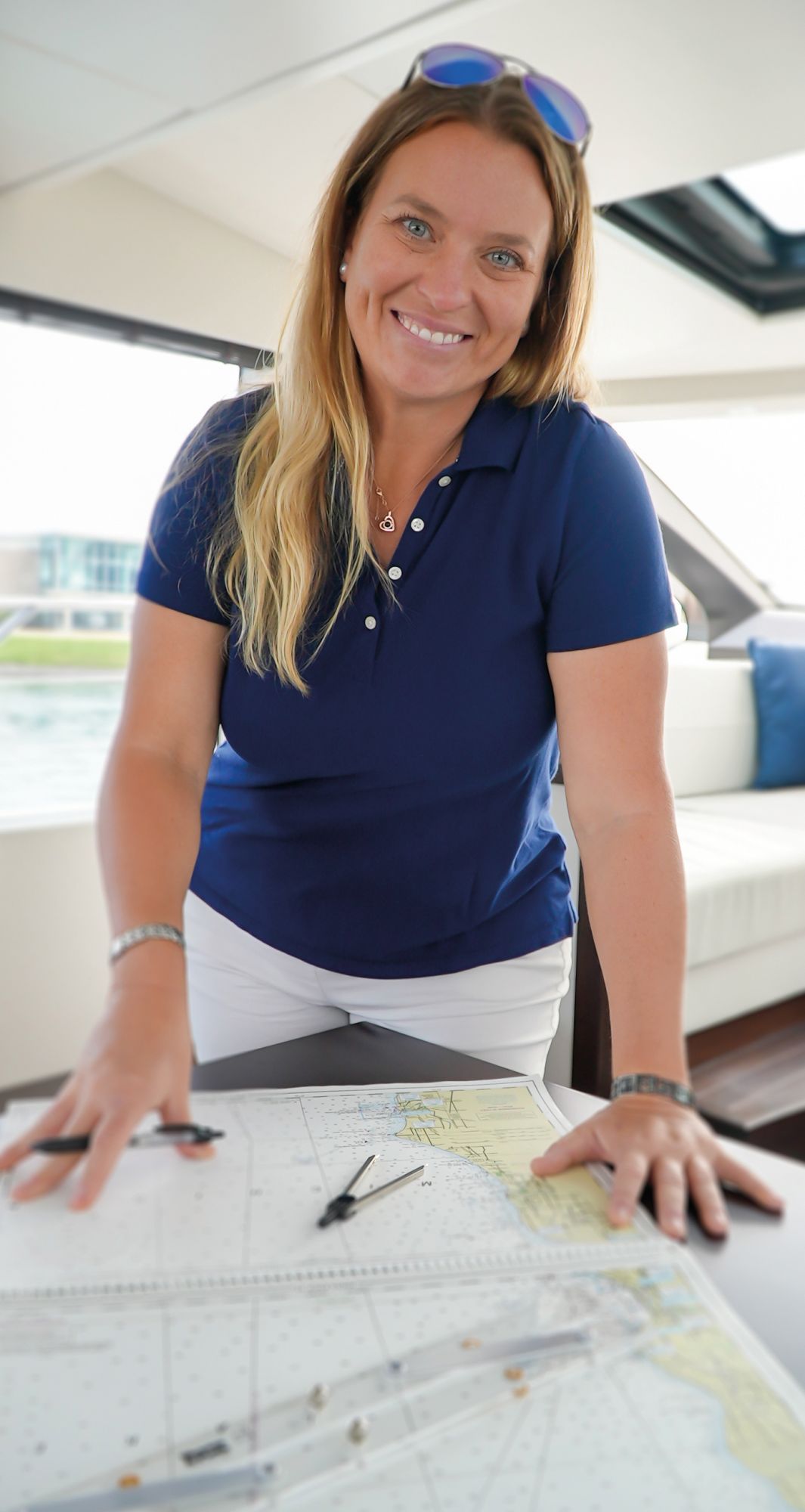The chemistry of yachting
Captain Kelly Gordon is helping reshape superyachting. Here, she shares how setting foot on a yacht for the first time changed her life, how mentorships make a difference, and why owners and the industry need to better understand crew mental health.
Written by Diane M Byrne
06 September 2023
Earning her the respect of fellow superyacht captains, crew members and yachting industry professionals, Captain Kelly Gordon’s leadership approach, her love for her job and her desire to shine a light on crew mental health have also earned her thousands of social media followers.
She posts short, informative videos as part of The Captain’s Classroom, covering all things yachting.
With previous experience at the helm of vessels including Freddy, Corporate Retreat and Everest, Captain Kelly Gordon is currently skippering the 108-foot Pershing motor yacht Andiamo II.
She’s also forging a path as one of very few female yacht captains in the industry. And yet, she says candidly, “I didn’t come into the industry slinging elbows with a point to prove – I just wanted to be a captain.”
Ocean magazine: You grew up in a landlocked part of the United States and were a chemistry lecturer. What convinced you to pursue a career in yachting?
It was by complete accident that I was introduced to the industry. After obtaining my undergraduate degree in chemistry in Indiana, I went on to obtain my master’s degree in North Carolina. Little did I know just how close to the ocean I’d be, and I had even less awareness of the significance that the town I chose to call home – Beaufort, North Carolina – has to the industry!
A woman who was an integral part of the small town saw that I was new to the community and wanted to show me around. Our first outing was a party on a yacht. I literally got no further than the back deck and said to myself, “This is what I want to do!”
What were your goals when you became a crew member? Did you envision becoming a captain?
My goal was most definitely to become a captain. I love to lead, and I love to challenge myself. I’ve always had a leadership mindset – it’s the way our mum raised us. I love all the other aspects of being a captain, too – navigation, boat handling, crew, owners, budgets, engineering. Yachting is like a puzzle, and I love being able to put all the pieces together.
What are some of your professional highlights?
I’m living them! I’ve grown such a voice in the industry and have been able to have a positive impact on so many lives. The Mental Health in Yachting seminar I held at the Palm Beach International Boat Show was my first seminar, and 80 people attended! I feel we have an obligation to give back during our time on this planet, and I’m trying my best to do so.
What do you know now that you wish you’d known at the start of your career?
Time. I wish I’d taken more time to take classes. I’m coaching my mate through that now, and I just said to him the other day that I wish someone had told me to squeeze in as many classes as possible whenever I had the chance.
It takes time to become a captain – don’t be in a hurry; there’s a tonne to learn before you start taking other people’s lives into your hands.
Have you ever been faced with a dire situation at sea?
Yes, there has been a fire on my vessel and two rescues aboard other vessels in the last year, one of which happened in mid-April. We’d just picked up a charter in the Bahamas and as we got settled in Norman’s Cay in the Exumas, my first officer and engineer radioed me in the wheelhouse to ask if I’d heard a mayday call. I said no, but they were getting a clearer transmission on the tender.
I walked out to the tender and started communication with the vessel. Within minutes, I looked at my first officer and said, “Let’s go” – my engineer had already grabbed our medical bag.
My first officer and I went to Shroud Cay, where the emergency was, and with just one look at the vessel’s captain I knew he was in trouble – he couldn’t speak, couldn’t move and had extremely high blood pressure. The others were hesitant to say he needed to go, but I wasn’t. I looked at his wife and just said, “He has to go!”
Between the crew aboard the motor yacht Reflections, the motor yacht Valentine and two other boaters on board, we got his blood pressure down and used a portable stretcher from our medical bag to get him onto our tender – we quickly stopped at our boat for more help as it was a bit of a walk to the runway on Norman’s Cay with a grown man on a stretcher. He’s now recovering well from emergency brain surgery; the man is a miracle.
Captains are overwhelmingly male – did you encounter resistance when pursuing your path?
Almost everyone has been so supportive, but that’s largely because of my mindset. I understand I’m in a male-dominated field and, while I want to change that, it’s important to show a great deal of respect to those who were here before me. I ask the men for help, for guidance, thank them for sharing their knowledge, respect them, and they know I admire them.
I didn’t come into the industry with a point to prove. I just wanted to be like them and respected for my ability. There have been a few sticks in the mud along the way, but again, it’s a mindset. I just let them fuel my desire to become better.
Why do you think there are still so few female captains, and what can be done to create a better balance?
There are a few reasons. It seems you get guided to interior roles if you’re a woman and exterior ones if you’re a man. Family life is likely another – childrearing would be hard as a captain. The role is somewhat intimidating to young women entering the industry, but we’re making progress.
There are more and more female captains, and there’s more and more support for the role. As we encourage and support more women, we will see more of a balance.
Being a captain is prestigious, but it’s also stressful and can be isolating. You’ve discussed your struggles – why, and what was the reaction?
I chose to share my struggles for a very simple reason – I’m the happiest I’ve ever been, but that wasn’t always the case. I want people to know that if you’re willing to put in the work, it’s so worth it! I want people to know they’re not the only ones who have ever felt depressed, lost, isolated or anxious.
Every single one of us has experienced those feelings in one way or another. It’s ok to not be ok, but it’s not ok to stay that way. If by sharing my story I can help just one person, then it’s worth it. It has helped others to speak up – I have trouble keeping up with all the messages I receive daily.
What are some of the challenges crew have shared with you? And what do owners need to know when it comes to crew members’ states of mind?
Bullying, sexual harassment, drug and alcohol abuse. It’s been the gamut – everything from drunk captains and chief stews bullying the second stew, to rape. It seems many crew don’t know where to turn or what to do – they often feel lonely, isolated and anxious.
Owners need to try and understand better what our jobs really entail. When on charter, you’re working 16-hour days, not to mention living with, eating with and sharing a space with the same people.
And, if you’re on a charter or a boss trip, you can’t get away. I don’t think they realise we give up any sort of normalcy. We don’t just clock in at nine and out at five. We’re away from family, and we miss a lot. It’s important to have proper downtime.
Owners also need to be better educated on what it takes to run a truly good program. Trying to run a six-crew boat with three full-time crew is nearly impossible. It causes burnout, results in high staff turnover, and increases maintenance and employee costs.
I’ve often wondered if there’s a way for builders and brokers to educate owners on not just taking care of their boat, but taking care of those who look after it – I don’t think owners realise the level of burnout, isolation, anxiety or depression that crew often feel.
Why do you think crew mental health hasn’t been a public conversation before?
For some of the same reasons we don’t speak about it in general – it seems the topic is shameful, and it’s not viewed as an illness that needs care. In the maritime sector, we’re together 24/7.
No other industry has that added element so, in some respects, it’s understandable it’s not quite clear how to address our mental health and the challenges we face. To be honest, though, I think it’s because it’s still not viewed as an illness.
Can mentorships address some of these struggles? What else might help?
Yes! Mentorships are so important. I attribute a large portion of my success to having a great mentor, and the most successful people in all industries will speak of having one.
A mentor provides you with someone to speak to not just about the career-specific skillset required but also the strain it may put on your mental health. Other effective tools would be mental health first-aid training and counselling when needed – having a basic knowledge of what to look for in a troubled crew member and how to address it could potentially be the difference between life and death. Counselling is a great way to learn how to address your personal struggles. I find YouTube, books, articles and free workshops, to name a few, are effective.
You’re active on social media, especially in a series you call The Captain’s Classroom. What do you cover and why?
The series came as a way to combine my love for teaching and yachting. I taught college-level chemistry before becoming a captain, so understanding how young adults (the majority of crew) learn, which is mostly online, I created The Captain’s Classroom. The videos are anywhere from 30 seconds to three minutes and discuss anything yachting. The intent is to give new yachties a leg up. My other social media posts depict life on board; they’re intended to be a source of inspiration.
What advice would you give someone wanting to become a crew member?
Take as many opportunities as you can early on, even if you think you won’t like the specific task. It will show you’re willing to be a team player and expose you to other areas you might end up liking.
Be conscious of how you act in public and on social media. It’s a small industry, and word gets out. Don’t stay on a boat that isn’t a good fit, but also don’t give up too soon. And lastly, save your money!










